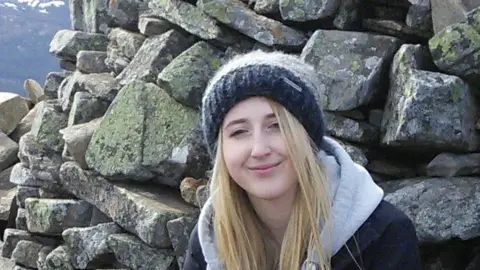Coroner says GPs' knowledge of anorexia 'woeful'
 Wallace Family
Wallace FamilyA coroner said GPs' knowledge of eating disorders was "woeful and inadequate" after an inquest into the death of a severely anorexic woman.
Madeline Wallace, from Peterborough, died in January 2018 from sepsis.
Coroner Sean Horstead told the inquest at Huntingdon Law Courts "different clinical decisions" would not have prevented her death.
He delivered a narrative conclusion saying Miss Wallace died of natural causes caused by severe anorexia.
But Mr Horstead said he would write a Prevention of Future Deaths Report and send it to NHS England chief executive Sir Simon Stevens and Health Secretary Matt Hancock.
Miss Wallace's parents, Christine Reid and Stuart Wallace, said changes were needed to overcome what they called "NHS staff's limited experience and understanding of anorexia, and poor safety-net systems".
In a statement, they said: "These need to be implemented as soon as possible to stop any further tragic deaths of young people with everything to live for.
"There have already been too many such deaths in this region, and elsewhere."
 Wallace Family
Wallace FamilyThe inquest heard Miss Wallace was the third in a "cluster of deaths" linked to eating disorders.
Mr Horstead said: "A theme that has emerged concerns the adequacy of monitoring high-risk anorexia nervosa suffers."
He said that he "remained concerned" and efforts to improve monitoring had been "frustrated by insufficient uptake by GP practices".
The coroner described it as a "national issue".
He also said coroners had "under-reported" anorexia's direct and indirect contribution to deaths.
Miss Wallace was diagnosed with anorexia nervosa in October 2016 and had "rapidly lost weight" during her first term as a medical student at Edinburgh University in 2017.
She returned home to Peterborough in December 2017 to focus on her recovery.
 WALLACE FAMILY
WALLACE FAMILYMr Horstead said there were "opportunities" in the days before her death to medically assess Miss Wallace and potentially diagnose her infection.
But he said because the infection was the result of her severe anorexia "different decision making would not have prevented death".
Mr Horstead said Miss Wallace was a "gifted, highly intelligent young woman... whose life was brutally cut short".
If you are affected by any of the issues in this story, you can talk in confidence to eating disorders charity Beat by calling its adult helpline on 0808 801 0677 or youth helpline on 0808 801 0711.

Find BBC News: East of England on Facebook, Instagram and Twitter. If you have a story suggestion email [email protected]
